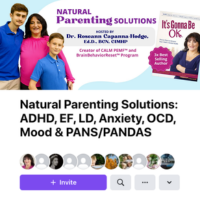Everyone has their share of unavoidable chaos and craziness to deal with during a typical day causing them to feel disorganized but mindfulness meditation improves executive functioning. It is no easy task for parents to manage their stress levels, hold things together for the family, and remember countless pieces of information with a reasonable degree of accuracy (such as where to pick up what child and when, what to buy at the store, or where did I put my shoes???) Children react differently to daily stressors than adults which is one reason why mindfulness meditation improves executive functioning in kids.
What Is Executive Functioning?
Executive functioning skills are controlled by the brain’s frontal lobe. These skills are the ones related to focus and organization. Some people seem to always have their lives in order, with the perfect lists and the perfect schedules. These people are the ones with strong executive functioning skills.
Some people, often those with Attention Deficit Hyperactivity Disorder (“ADHD”), have a hard time focusing, managing time, switching focus, and controlling their impulses. These people have problems with executive functioning skills. While it may be easy to dismiss them as “flighty,” that is not the case at all.
The frontal lobe can affect executive function in multiple way, including:
1. Organization: The ability to gather and order information to process it and organize materials
2. Working memory: Is a system for temporarily storing and managing the information required to carry out complex cognitive tasks
3. Regulation: Being able to take in your environment and control your response to it
4. Inhibition: The ability to stop one's own behavior at the appropriate time,including stopping actions and thoughts.
5. Shift: The ability to move freely from one situation to another and to think flexibly in order to respond appropriately to the situation. This can be within a task or between tasks.
6. Initiation: The ability to begin a task or activity and to independently generate ideas, responses, or problem-solving strategies.
People with executive functioning problems can have problems with one or both of these skills. Think about all those times where you’ve gone out to dinner. Organization is where you can easily break down the menu into two choices, a healthy salad and the big, greasy, deliciously dripping cheeseburger. Regulation is recognizing that you want the cheeseburger but choosing the salad because it’s the better choice.
How Does Daily Stress Impact Executive Function?
Research consistently proves that even daily stress can cause executive function problems. One 2006 study on daily stress and cognition noted that stress negatively impacted working memory and reduced response times in the sample. When the brain is trying to negotiate too many incoming data points, it has a hard time organizing and regulating.
Even children experience daily stress. Between school, homework, and extracurricular activities, children today are busier than their parents were. With children being pulled in so many directions, their lives are stressful. They may not be paying bills or mortgages, but considering their brains are still developing, this is a lot of input.
When students are experiencing high levels of stress, their prefrontal cortex goes “offline” and the primitive brain functions of fight-flight-freeze come “online”. The nervous system must be settled to access reasoning, communication, and conflict resolution skills, in addition to other executive functions. Because the brain reacts to stress in its environment, mindfulness meditation improves executive functioning by helping to control the incoming information.
How Does Executive Function Cause Emotional Dysregulation?
Regulating one’s emotions can be a challenge for those with Executive Functioning issues and ADHD. Emotional Regulation refers to a person’s ability to understand and accept his or her emotional experience, to engage in healthy strategies to manage uncomfortable emotions when necessary, and to engage in appropriate behavior when distressed.
Some children lack the intact executive functioning skills required to navigate daily tasks and responsibilities with success. When they are overwhelmed by the amount of information coming into their brains, their brains start to shut down. In other words, when our brain is under stress, a typical response is fight, flight or freeze.
Emotional dysregulation or “meltdowns”
Emotional dysregulation describes when one exhibits an emotional response that is poorly modulated; often an over reaction that is outside of what is normally expected. When children’s brains are overwhelmed, the mechanisms underlying emotional regulation shut down leading to “meltdowns.” Despite looking the same as a tantrum, a “meltdown” is a different beast. One way to think about this is “Going into the red.” The person’s emotions cause them to shut down. They are lost in the emotional and mental chaos.i. Once in the “red”, children are often unreachable and unresponsive to parenting techniques or logic. After the meltdown, children and parents are left sad, defeated, and shameful.
Focus and attention
Children with compromised executive functioning skills often appear to be inattentive. Think of all the times you’ve screamed, are you listening to me?!” Despite yelling at the top of your lungs, your child seems to be ignoring you in lieu of that television show/book/video game. While it may seem your child is ignoring you, it’s also possible that your child is having a hard time organizing information.
Children feel constantly reprimanded (because they aren’t listening!!!). Meanwhile, parents are totally stressed out by the incessant nagging needed for their child to complete simple tasks like brushing their teeth. It is hard to be a child’s frontal lobes, but also difficult to be a loving parent who is able to keep their stuff together!
Task Incompletion
Repeating yourself time and again often frustrates parents more than any of the other behaviors associated with executive function issues. Think of all the times you’ve said, “how many times have I asked you to…!” You know you’re a parent of a child who lacks executive function if you’re nodding your head in solidarity. In the same way that focus, attention, and meltdown can be triggered by daily stress, so can task incompletion.
Children with executive functioning are challenged when asked to shift their attention from one task to another. They also find it difficult to sustain their attention during less desirable tasks. They tend to hyper focus on a preferred task (e.g., Legos, iPad, etc). When asked to move on to another, they lack the self-regulation skills to do so; and there lies the heart of the battle.
What is mindfulness meditation?
Mindfulness, as defined by Jon Kabat-Zinn, professor, author, and developer of the Mindfulness-Based Stress Reduction (MBSR) program, is “paying attention in a particular way: on purpose, in the present moment, and nonjudgmentally.”
Being mindful means becoming aware and attentive to what is happening around you, as well as what is happening in your own mind and body. Therefore, mindfulness-based strategies will naturally settle the nervous system and create a sense of relaxation and calm.
Through meditation, one increases Alpha brain waves, which results in decreased stress, anxiety, and depression, lower blood pressure, improved immune function, decreased pain, increased memory, executive functioning and attention, and increased grey matter.
How can mindfulness improve executive functioning deficits?
Mindfulness activities and strategies are known to have a settling, or calming, effect on the brain and the body. According to Mindful Schools, children who use mindfulness in the classroom experience increased access to the functions of the prefrontal cortex and are better learners as a result. Since the prefrontal cortex controls organization and self-regulation, children who can access this area more easily can focus on work more effectively.
Simple strategies such as mindful breathing, mindful listening, or doing a body scan can be done in 1 to 2 minutes, and these strategies bring about immediate positive effects on executive functioning.
How does mindfulness help with ADHD?
Mindfulness is not meant to be a “cure” for diagnoses such as ADHD or Autism Spectrum Disorders. Mindfulness strategies have been proven by research to decrease anxiety and emotional reactivity, improve attention, and help children become more able to handle daily challenges and choose their behavior.
In one recent study, Hwang and colleagues (Journal of Child and Family Studies, 2015) studied families who underwent an 8-week mindfulness program, and found that it led to an increase in the quality of family life, reduction of stress in parents, and reduction of anxiety and thought problems in children with ASD.
Our office has used mindfulness techniques with children with ADHD and ASD diagnoses with a great degree of success. For children who are “sensory” (both hyper-sensitive or sensory seeking), many are drawn to the experiential and sensation-based elements of mindfulness strategies.
One of the fantastic benefits of teaching mindfulness to children is that you are actually teaching them how to notice, and gently change, their thoughts and emotions on their own. This builds their capacity to stay regulated and focused for longer periods of time.
What can I do as a parent to help my child learn mindfulness?
As parents, we have to take a gentle, nonjudgmental peek in the mirror and ask ourselves, are we taking a few moments throughout the day to be mindful? Remember, we model for our children constantly. If you have not made the time to bring mindfulness-based activities and strategies into your home, now is the time to do so.
There are many resources out there that have been developed to help children of all ages and parents practice mindfulness in a way that is fun and interesting. One of my favorite resources is “Sitting Still Like a Frog” by Eline Snel. It is a little gem of a book that comes with a guided exercises CD. The mindfulness exercises can be done alone or with your children. Here are some other helpful books on mindfulness:
– A Handful of Quiet: Happiness in Four Pebbles by Thich Nhat Hanh
–Master of Mindfulness: How To Be Your Own Superhero in Times of Stress by Laurie Grossman
–Moody Cow Meditates by Kerry Lee Maclean
–Peaceful Piggy Meditation by Kerry Lee Maclean
–Sea Otter Cove: a Relaxation Story by Lori Lite
–I think, I am! By Louise Hay
–Unstoppable Me! 10 Ways to Soar Through Life by Wayne Dyer
–Mindfulness and Yoga Skills for Children and Adolescents by Barbara Neiman
Creating moments between the episodes of chaos and craziness in life to practice mindfulness will, over time, make those episodes more tolerable…and you and your children will enjoy the benefits of improved executive functioning.
To learn more about mindfulness techniques, read my blog: Mindfulness techniques.
Looking for support for your unfocused child with ADHD or executive functioning challenges, then register for Dr, Roseann's FREE webinar, 5 Ways to Boost Your Child’s Executive Functioning and Attention at School, where Dr. Roseann will show you how to help your child or teen be more alert, listen, develop skills to be independent and self-sufficient and improve task completion.
Always remember… “Calm Brain, Happy Family™”
Are you looking for SOLUTIONS for your struggling child or teen?
Dr. Roseann and her team are all about solutions, so you are in the right place!
There are 3 ways to work with Dr. Roseann:
You can get her books for parents and professionals, including: It’s Gonna Be OK™: Proven Ways to Improve Your Child’s Mental Health, Teletherapy Toolkit™ and Brain Under Attack: A Resource For Parents and Caregivers of Children With PANS, PANDAS, and Autoimmune Encephalopathy.
If you are a business or organization that needs proactive guidance to support employee mental health or an organization looking for a brand representative, check out Dr. Roseann’s media page and professional speaking page to see how we can work together.
Dr. Roseann is a Children’s Mental Health Expert and Therapist who has been featured in/on hundreds of media outlets including, CBS, NBC, FOX News, PIX11 NYC, The New York Times, The Washington Post,, Business Insider, USA Today, CNET, Marth Stewart, and PARENTS. FORBES called her, “A thought leader in children’s mental health.”

She is the founder and director of The Global Institute of Children’s Mental Health and Dr. Roseann Capanna-Hodge. Dr. Roseann is a Board Certified Neurofeedback (BCN) Practitioner, a Board Member of the Northeast Region Biofeedback Society (NRBS), Certified Integrative Medicine Mental Health Provider (CMHIMP) and an Amen Clinic Certified Brain Health Coach. She is also a member of The International Lyme Disease and Associated Disease Society (ILADS), The American Psychological Association (APA), Anxiety and Depression Association of America (ADAA) National Association of School Psychologists (NASP), International OCD Foundation (IOCDF) International Society for Neurofeedback and Research (ISNR) and The Association of Applied Psychophysiology and Biofeedback (AAPB).
© Roseann-Capanna-Hodge, LLC 2023
Disclaimer: This article is not intended to give health advice and it is recommended to consult with a physician before beginning any new wellness regime. *The effectiveness of diagnosis and treatment vary by patient and condition. Dr. Roseann Capanna-Hodge, LLC does not guarantee certain results.













